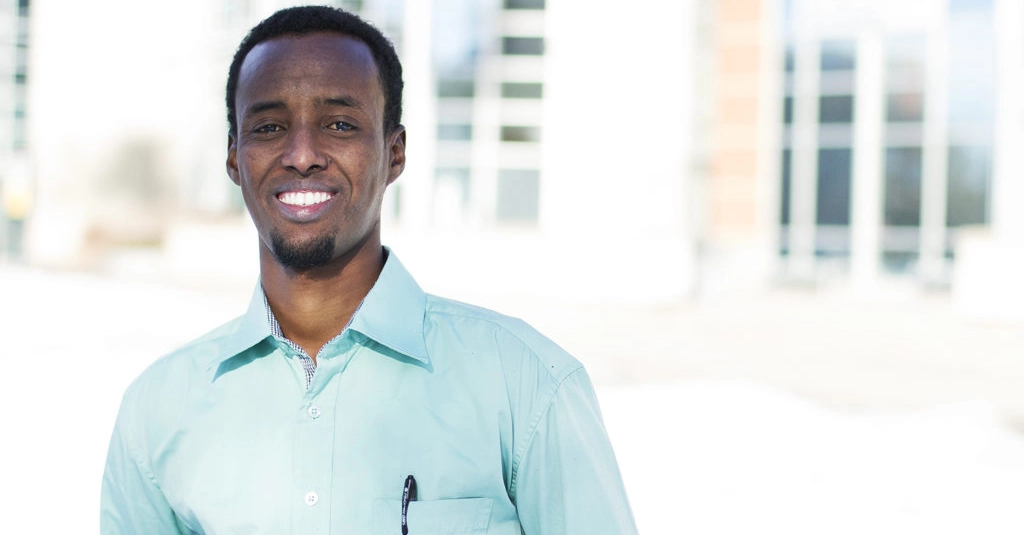In 1978, the World University Service of Canada (WUSC) started the Student Refugee Program, through which 61 post-secondary institutions in Canada continue to sponsor students. According to WUSC’s website, more than 1,400 students have been brought to Canada from refugee camps across the globe. The Students’ Association of MacEwan University (SAMU) has been sponsoring students for four years, and it is currently sponsoring its fifth student, Aden Omar. The program is expected to continue for the long term, with the possibility of increasing the number of students being sponsored each year.
To fund the program, each MacEwan student is charged a fee of $2.50 per term — about the price of a large cup of coffee.
“This covers tuition, housing, living expenses, a U-Pass — all the things that are required to go to school,” says Leanne Hailey, the SAMU programs and services manager at Alberta College Campus.
SAMU and WUSC work with Immigration Canada to fly the selected candidate to Canada. Each student is sponsored for two years, and, upon coming to Canada, is given permanent residence status and access to grants, scholarships, and bursaries.
Participants in the Student Refugee Program come from countries of asylum, meaning that they have been persecuted within their own country and must seek refuge in neighbouring areas. These students apply for the program and, if accepted, WUSC decides which Canadian universities they will attend.
According to the WUSC website, the requirements for the Student Refugee Program are as follows: “Be between the age of 17 and 25; have completed secondary school; be a recognized refugee in his/her country of asylum; express the need to be resettled; be proficient in English or French; be single, without dependents, and able to resettle in Canada; be self-reliant and mature.”
Omar, MacEwan’s most recent student refugee, comes from Dadaab, Kenya.
According to the United Nations Refugee Agency (UNHCR), Dadaab hosted 331,404 Somali refugees in 2015. At the end of last year, the UNHCR reported that Dadaab, which is made up of five settlements, is the most populous refugee complex in the world.
“Life is very hard there . . . refugees are not allowed to go out of that area. We don’t have the freedom to move around the country,” says Omar, who now lives in MacEwan’s student residence building and rooms with MacEwan’s 2014 student refugee.
Omar’s mother and three sisters still live in Dadaab and face the daily challenges of living in a refugee camp.
“What is really killing the dreams of the young people is when they reach high school,” says Omar. “Beyond high school, there are very rare opportunities.”
He states that of the 20 students who were able to come from Dadaab, 50 other applicants remained there. As each year passes, more and more students apply to come to Canada, but acceptance rates haven’t increased accordingly.
“The students — the youth in Dadaab camps there — the main dream they have is to come to this country to further their education. Because, out of all the countries in the world, it’s only Canada that offers this program,” says Omar. “If you go and ask a Grade 1 student ‘What’s your dream?’, he or she will tell you ‘I want to go to Canada.’”
According to WUSC’s website, “The SRP is the only program in the world that combines resettlement with post-secondary education, providing refugee students with the opportunity to achieve their academic goals in a safe learning environment.”
For many students, not qualifying for the program can lead to a lack of motivation and limited opportunities, as attempts to further one’s education may put working or learning a trade on hold.
“I have seen so many students who did not qualify . . . and then, at the camp, had nothing to do. They missed the opportunities that are there,” says Omar. “They are not working, they are not learning, and it is sad . . . so I decided to double my effort.”
Omar is currently taking ESL classes, and he plans to begin his bachelor of science in the fall. He hopes to become a doctor, so that he can go back to Dadaab and help those in need. His interest in biology has helped him get to where he is, and the Student Refugee Program will hopefully get him to where he wants to be.
Omar says that being separated from his family has been hard, but that his basic needs are now taken care of, allowing him to focus all of his energy on his studies. He says that he wishes more students could be accepted into the Student Refugee Program to benefit from it as well.
“It would be amazing — I would be so appreciative — if they could increase the number of students [accepted into the program],” Omar says.
Photos by Madison Kerr





0 Comments